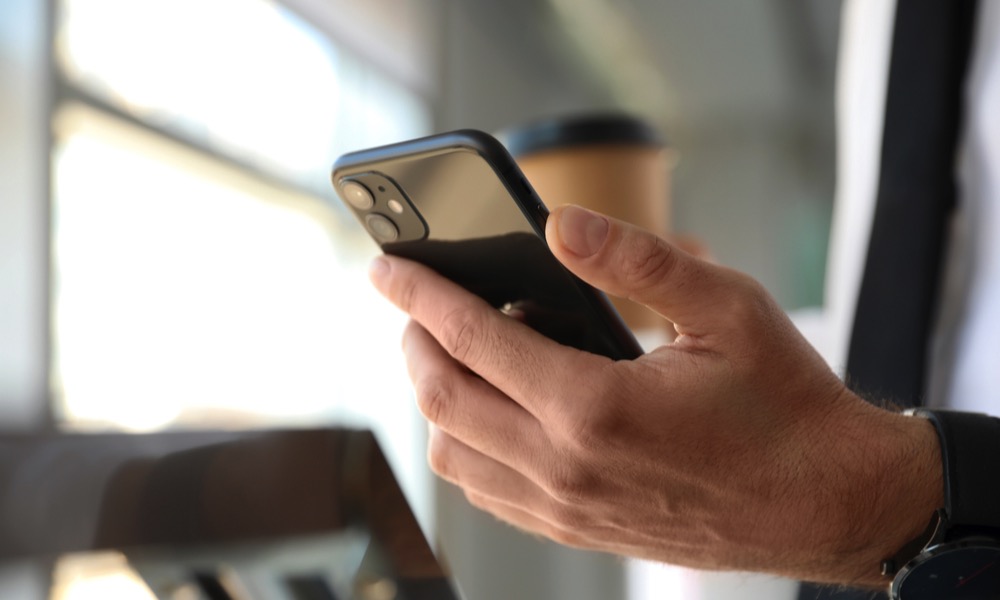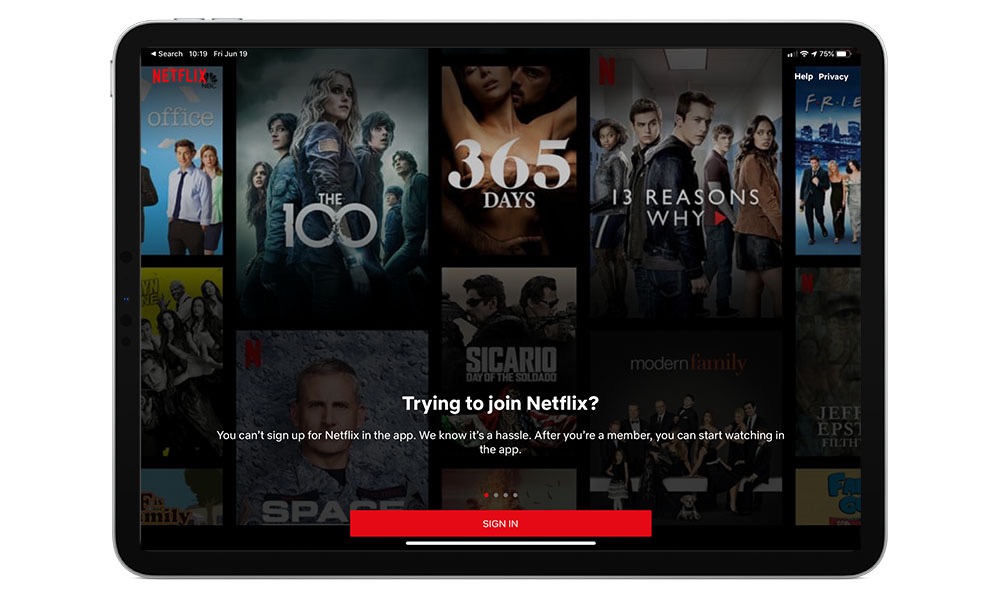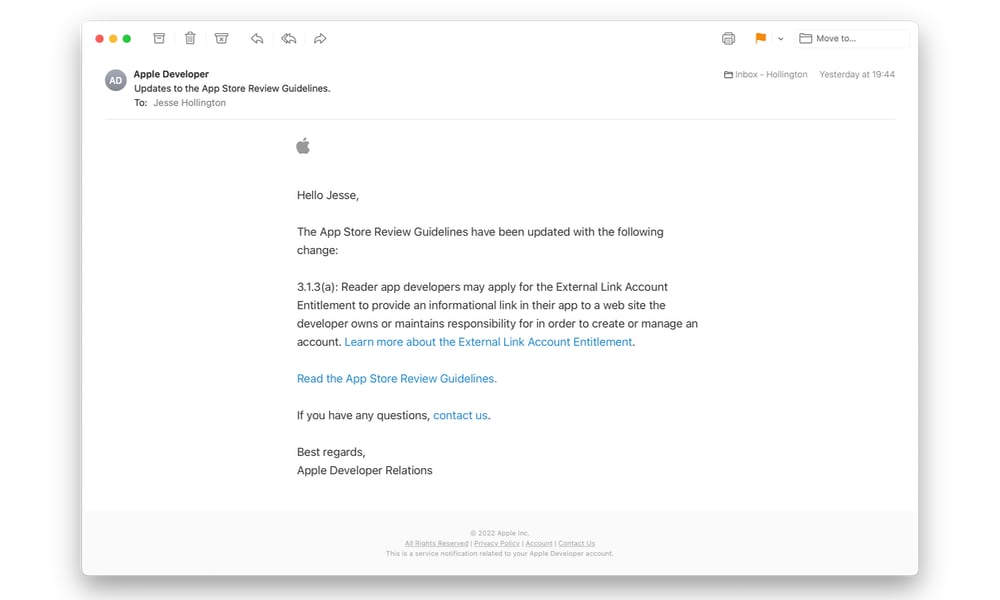Apple Relaxes App Store Rules
 Credit: New Africa / Shutterstock
Credit: New Africa / Shutterstock
Toggle Dark Mode
For years, Apple has stubbornly refused to offer any loopholes that would allow users to pay for apps, content, or services without going through Apple’s in-app purchasing system — and giving Apple a whopping 15-30 percent cut of those transactions.
While Apple’s App Store payment system has some definite advantages, there are several areas in which Apple’s policies have seemed downright silly. The most draconian of these has been the company’s “anti-steering” provisions — a rule that says that apps can’t even admit there’s another way of paying for a subscription.
This rule is why opening an iPhone or iPad app like Netflix for the first time presents you with a sign-in page that requires you already have an account.
According to Apple’s policies, Netflix can’t even tell potential customers that they have to sign up for service on the Netflix website.
Although most folks shouldn’t have a hard time figuring this out for mainstream apps like Netflix or Spotify, not every developer has the benefit of being nearly as well-known.
It’s easily Apple’s most indefensible rule, and it’s the one thing that’s most raised the ire of competitors, courts, and government regulators. It was the only piece of ground that Apple lost in its landmark case against Epic Games, and it was on this point that the Japan Fair Trade Commission (JTFC) found fault with Apple last summer.
At the time, Apple headed off the JTFC investigation by agreeing to allow developers of “reader” apps to begin including “an in-app link to their website for users to set up or manage an account.”
Last fall, Apple announced that it would be relaxing its App Store rules to permit certain apps to link customers to their own subscription payment pages, and now it looks as if it’s making good on that promise.
Apple promised this change would go into effect in early 2022, and this week it’s made it official with an update to the App Store Review Guidelines:
3.1.3(a): Reader app developers may apply for the External Link Account Entitlement to provide an informational link in their app to a web site the developer owns or maintains responsibility for in order to create or manage an account.App Store Review Guidelines
Apple has also sent out emails to its registered developers to notify them of this change. However, it turns out there are still a few catches.
Firstly, it only applies to a narrow category that Apple calls “reader” apps. The word “reader” is somewhat misleading since it encompasses audio, music, and video streaming apps. In the same 3.1.3(a) section of the App Store Review Guidelines where Apple made its change, it defines these as apps that “allow a user to access previously purchased content or content subscriptions (specifically: magazines, newspapers, books, audio, music, and video).”
This will encompass all the big streaming apps, such as Disney+, Netflix, Amazon Prime Video, Spotify, and Tidal, plus actual reading apps like Amazon’s Kindle.
However, if you read Apple’s update carefully, you’ll notice a second catch: Qualifying app developers must still apply for permission to provide this external link. It won’t be automatic; Apple has to grant what’s called an “entitlement.”
Apple uses entitlements for many things on the App Store. Entitlements control which apps can use CarPlay features, become a default browser, or tie into Apple’s COVID-19 Exposure Notification System. There are also entitlements for more mundane things, like access to notes in your Contacts; not every app gets to do that, even if you’ve otherwise permitted it to read your Contacts.
So, this new entitlement for “reader” apps to use an external link isn’t a new concept, but it does give Apple control over the process. Most likely, this is simply a way of allowing Apple to define what is and isn’t a “reader” app, as there wouldn’t be any obvious ways to do so otherwise.
Of course, the App Store review team could still deny non-reader apps from using external links, but the requirement that developers apply for an entitlement solves this problem before an app even gets submitted. Otherwise, Apple would just be opening the floodgates, and every developer would be trying to skirt the rules.
Whether these rules should exist is another debate entirely. Even without this new exemption, Apple’s decision to single out “reader” apps is controversial. Apps for other paid services don’t fall under the same rules, and some have been kicked off the App Store entirely.
Apple’s External Link Account Entitlement requirements also go beyond simply limiting it to “reader” apps.
- It would appear that developers can’t have it both ways. Apple specifically says that apps using the entitlement must “not offer in-app purchases on iOS or iPadOS.” Developers either get to use Apple’s in-app purchasing system or direct users to their website, but not both.
- The “informational link” also can’t be used to “facilitate real-time, person-to-person services.” This includes tutoring services, medical consultations, real estate tours, and fitness training.
- Accessing magazines, newspapers, books, audio, music, or video must be the “primary functionality” of the app. This specifically leaves out apps like Facebook and Twitter.
Note that developers of “reader” apps don’t need to apply for the new entitlement unless they want to link to a website “for account creation and management.” Apple also notes that being approved for the entitlement doesn’t guarantee that the App Store review team will accept an app that uses that entitlement. The developer could change the app’s functionality such that it no longer qualifies as a “reader” app.









